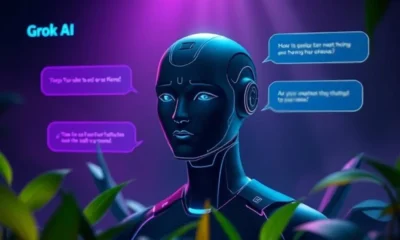Artificial Intelligence
Can AI Chatbots Replace Google? The Rise of Web-Enabled Assistants
Could AI chatbots replace Google as the go-to search tool with the rise of web-enabled assistants? This article dives into how conversational AI is reshaping online search trends and challenging traditional search engines.

People rely on Google search to find answers instantly, but AI chatbots are reshaping how we access information. I’ve seen how conversational AI can deliver direct, personalized responses without requiring multiple searches. This adjustment leads us to wonder if chatbot AI technology can beat Google in dominating online information access.
AI chatbots use advanced natural language processing to understand queries and generate responses like a human. They reply fast to users and serve filtered information based on the query. Do chatbots based on AI perform more reliably at accessing greater amounts of information when compared with standard search AI tools?
I’ll explore the strengths and weaknesses of AI technology, compare it to search engines, and discuss the future of search. Let’s see how these innovations impact Google dominance, personalized search, and online search trends.
Role of Google in Information Retrieval:
Google search transformed how we find information by indexing billions of web pages. Its search engine optimization (SEO) algorithms rank results based on relevance, credibility, and user engagement. People depend on Google to receive fast responses and to explore products plus new subjects.
Over the years, Google refined its system using AI innovation, improving search suggestions, featured snippets, and voice search. The rise of voice assistants like Google Assistant further enhanced accessibility, making it easier to get answers hands-free.
Strengths of Google: Why It Remains Powerful:
-
Massive Index: Google processes trillions of searches yearly, covering nearly every topic.
-
Ranked Results: Websites compete for top positions, ensuring the most optimized content appears first.
-
Diverse Content: Search results include articles, videos, forums, and images for a complete research experience.
-
SEO Optimization: Businesses and content creators follow SEO rules to improve visibility, benefiting users with structured content.
Weaknesses of Google: Where It Falls Short:
-
Information Overload: Users often get too many results, requiring extra effort to find reliable sources.
-
Ads Over Organic Results: Paid advertisements sometimes push down genuine, useful content.
-
SEO-Driven Content: Some articles are written to rank higher rather than provide clear, factual information.
Google search remains a powerful tool, but conversational AI is offering a new way to retrieve information. Can AI chatbots provide a personalized search experience that outperforms traditional search engines? Let’s explore further.
What Are AI-Powered Chatbots?
AI chatbots are intelligent programs that use natural language processing (NLP) to understand and respond to user queries. They produce direct answer results instead of listing multiple search results. Conversational AI allows them to engage users in interactive discussions, making information retrieval more seamless.
These chatbots rely on AI technology to analyze vast datasets and predict the most relevant responses. They track their performance in previous exchanges and become better at their work. Unlike Google search, which ranks web pages, AI chatbots provide a human-like experience by summarizing and explaining complex topics instantly.
Rise of Web-Connected AI: Chatbots with Real-Time Data
Recent advancements have led to web-enabled assistants like ChatGPT with browsing, Perplexity AI, and DeepSeek, which can fetch live internet data. Unlike earlier AI models that relied on pre-trained knowledge, these tools connect to the web, ensuring online search trends are up to date.
Companies are integrating AI innovation into chatbots, allowing them to access breaking news, real-time stock prices, and current research. This development challenges Google dominance, as users now have an alternative for finding instant, relevant answers.
How Web-Enabled Chatbots Fetch Real-Time Data?
-
Live Internet Access: Chatbots browse the web to gather the latest information.
-
Direct Answer Generation: They summarize multiple sources into a single response.
-
Personalized Search: AI tailors responses based on user preferences and past interactions.
Web-connected AI assistants are revolutionizing how people search for information. But do they offer a search engine replacement, or does Google still have the upper hand? Let’s explore their strengths and weaknesses next.
AI Chatbots vs. Google: Key Differences
Speed & Convenience: Which Is Faster?
AI chatbots provide direct, conversational responses without requiring users to browse multiple websites. Instead of sifting through Google search results, users get instant answers in a chat-like format. Searching becomes quicker and easier to handle through this method.
At Google users can select from various sources to find the most dependable content. The process takes more time because users must deal with unwanted advertisements alongside search engine optimization and irrelevant results. The AI-powered chatbot lets users find information without needing to click through several Google results.
Accuracy & Reliability: Which One Can You Trust?
Chatbots deliver summarized information but they produce wrong results when their data or logic is outdated. Even web-enabled assistants can misinterpret sources, making fact-checking essential. Conversational AI is improving, but errors still occur.
Google lists results by their reliability, putting research papers first followed by official websites and authorized news sites. However, search engine optimization (SEO) tactics can manipulate rankings, sometimes prioritizing engagement over accuracy. The system delivers dependable results though it may include biased content.
Personalization & User Experience: Which Adapts Better?
AI chatbots learn from interactions, remembering user preferences and adapting to behavior. This creates a personalized search experience where responses align with individual needs. The system learns and improves its outputs by providing better responses with time.
Google search, while powerful, remains static. It adjusts search results using past search history but cannot instantly update to new preferences. Users must adjust their search terms by hand yet chatbots handle continuous spoken exchanges to deliver better service.
Depth of Information: Which Provides More Detail?
Google delivers complete content that includes many different points of view. Users can use the platform to access a wide range of content including detailed text materials and visual media through discussion boards. The service lets users seek detailed information through research.
AI chatbots, however, condense information into short, digestible responses. While this is convenient, it can sometimes lack depth and context. Users may need to verify details or request additional explanations to get a complete picture.
AI-powered assistants are transforming the way we search for information, but can they fully replace search engines? Let’s explore their real-world impact next.
Rise of Web-Enabled AI Assistants:
How Web Browsing Enhances AI Chatbots:
AI chatbots are evolving with web-enabled assistants that fetch real-time data. These chatbots differ from basic systems that use stored knowledge because they connect to live feed sources to deliver new facts. The technology provides better results when handling news, stock market updates and academic research.
For example, ChatGPT with browsing can retrieve the latest articles and fact-check responses. Perplexity AI shows users where their search results come from by citing the original sources. These advancements make conversational AI a competitive alternative to traditional Google search.
Chatbots Integrating with Search Engines:
AI chatbots aren’t just replacing search engines, they’re enhancing them. Microsoft Copilot integrates Bing search, combining chatbot convenience with Google dominance in web indexing. Users can access AI suggestions while seeing verified links for more information.
Google itself is embracing AI technology with Google Bard, blending chatbot capabilities with search engine replacement potential. Bard produces natural speech answers in addition to presenting typical internet search findings. AI does not aim to replace search engines directly but instead transforms how they operate.
Real-World Use Cases:
Web-connected chatbots are being adopted across industries, making information access more efficient. Here are some examples of how people use AI-powered chatbots in daily life:
-
Professionals – AI chatbots provide quick insights, helping with decision-making, industry trends, and market analysis.
-
Students – AI assistants simplify research by summarizing complex topics and suggesting reliable sources.
-
Businesses – Companies use chatbots for customer support, automating responses while offering personalized recommendations.
With AI innovation shaping the future of search, the way we access information is changing. But does this mean Google search is becoming obsolete? Let’s examine what the future holds.
Can AI Chatbots Fully Replace Google?
Areas Where Chatbots Excel:
AI-powered chatbots are redefining how we access information by offering conversational AI experiences that streamline searches. Unlike Google search, chatbots summarize complex topics into easy-to-understand responses, saving time for users.
Users can use interactive Q&A to learn more easily through these systems. Users find all their answers in one place through dynamic chats where they can ask further questions to understand details better. This makes AI chatbots great for personalized learning.
Chatbots increase work output because they automate regular tasks. These tools help experts write better codes and research while setting schedules and producing written content for all users. The bots can handle regular operations to speed up work processes.
Where Google Still Wins:
While AI chatbots are impressive, Google search remains unbeatable in several areas. The main advantage of this system is that it confirms information from several different resources. Through its interface Google connects users to reliable content from trusted online publishers to provide them with precise information.
Google delivers a range of perspectives from blogs and forums plus news and academic documents when looking at broad research subjects. AI chatbots often provide concise summaries, but they may miss deeper insights or opposing viewpoints.
People continue to turn to Google as their main choice when they need to find items online or search for local places and specific details. Whether users are looking for nearby restaurants, product reviews, or business listings, Google’s vast index and SEO optimization keep it ahead of AI chatbots.
Future Possibilities: Will AI and Search Merge?
The future of search may not be about chatbots replacing search engines, but rather AI enhancing search experiences. The latest Google system combines chatbot intelligence with full text search access to serve users both direct answers and standard search findings.
As AI technology advances, we may see the evolution of AI-driven search interfaces, where users receive instant, personalized search results without manually browsing through links. Our new way of dealing with search engines will emerge from this transition.
Conclusion:
Google remains a dominant force in online search, but AI chatbots are rapidly evolving. They allow users to save time and get instant output when combined with a custom format that competes effectively with conventional search options.
While AI does not replace Google right now it transforms our way of obtaining information from the Internet. The line between search engines and AI assistants is blurring, bringing us closer to a new era of AI innovation.
Will future AI assistants eliminate the need for search engines? Only time will tell. What do you think? Share your thoughts in the comments below!
-

 Artificial Intelligence8 months ago
Artificial Intelligence8 months agoWhat is Artificial Intelligence? A Comprehensive Guide for Businesses and Enthusiasts
-

 Artificial Intelligence6 months ago
Artificial Intelligence6 months agoHow to Use Grok AI: A Complete Guide
-

 Artificial Intelligence8 months ago
Artificial Intelligence8 months agoUnlocking the Power of Artificial Intelligence Tools
-

 Artificial Intelligence7 months ago
Artificial Intelligence7 months agoWhat is DeepSeek? Revolutionizing AI with Cutting-Edge Solutions
-

 Artificial Intelligence3 months ago
Artificial Intelligence3 months agoAI Technologies in Warehouse Automation:
-

 Artificial Intelligence4 months ago
Artificial Intelligence4 months agoMeta’s AI Push: The Standalone Assistant App Set to Rival ChatGPT
-

 Artificial Intelligence3 months ago
Artificial Intelligence3 months agoHow Artificial Intelligence is Revolutionizing Logistics:
-

 Artificial Intelligence3 months ago
Artificial Intelligence3 months agoPredictive Analytics for Demand Forecasting:


